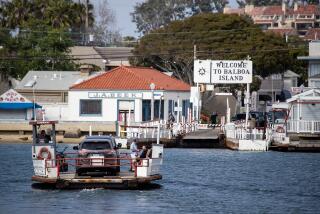Boaters are urged to abandon paints that have copper
- Share via
An Orange County environmental group plans to spend the next three years trying to wean Newport Beach boat owners from toxic copper-based paints that have proven highly effective in keeping barnacles off their hulls.
The problem, they say, is that the popular paints are deadly to fish, mussels and pretty much anything that lives in the bay.
“Boaters want to have a healthy bay as much as we do,” said Ray Hiemstra, a spokesman for Orange County Coastkeepers, which recently received more than $347,000 from the federal Environmental Protection Agency and the city for the effort.
Bob Brown, a spokesman for the Southern California Marine Assn., agrees, but with reservations.
“From the boaters’ standpoint,” he said, “these paints without copper aren’t nearly as effective.”
The conflict has been simmering at least since last year when the environmental group conducted water and sediment tests in Newport Bay marinas and found that copper concentrations exceeded state guidelines. Researchers attribute about 80% of the problem to residue from pleasure craft that routinely have hulls coated with copper-based paint. The results, the scientists say, could be devastating to the marine environment. Studies throughout coastal California have come to similar conclusions, prompting talk of anti-copper legislation.
Orange County Coastkeepers hopes to solve the problem through education, not regulation. “Basically what we’ll do is work to educate boaters on non-toxic options,” Hiemstra said.
The two most common, he said, are silicon-based paints -- which are so slick that barnacles fall off -- and epoxy-based paints, so hard that one can easily scrape the crustaceans off. While considerably more expensive to apply, he said -- about $10,000 for an average boat compared with $3,000 for copper-based paint -- the non-toxic paints last longer, making them slightly cheaper in the long run.
Beginning early next year, Hiemstra said, his organization will hammer that message home through publications, workshops, seminars and lectures. It also plans to offer financial incentives, he said, though the details are still vague. “There will be lots of personal interaction; [boat owners] are very used to doing things a certain way and they will need a good reason to change,” he said.
Brown, whose organization represents about 650 companies in the recreational boating industry, including some that manufacture and sell copper-based paints, agrees.
“What it means,” he said, “is that boat owners will have to pull their boats out more frequently to do hull scraping. Any time people think they’re going to be spending more money to use a product that’s less effective, there will be some unhappiness.”
On the other hand, Brown said, there’s a certain inevitability regarding the demise of the copper-based products.
“I don’t know whether it will happen swiftly or take a long time,” he said. “Obviously we don’t like things that make boating more expensive or difficult for boaters, but at the same time if there are products being used that are damaging to the environment you don’t want to continue that either.”
--
More to Read
Sign up for Essential California
The most important California stories and recommendations in your inbox every morning.
You may occasionally receive promotional content from the Los Angeles Times.













